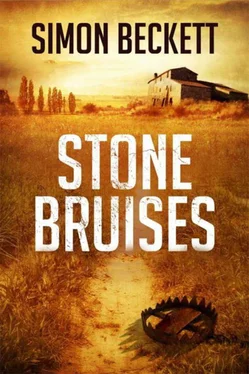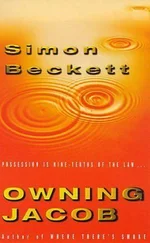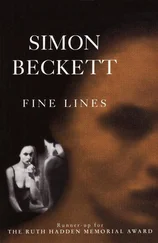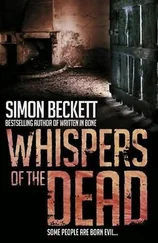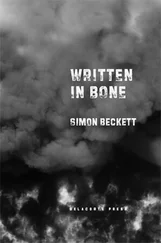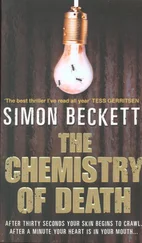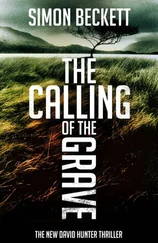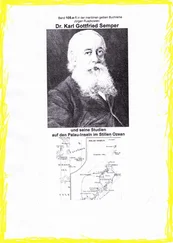For the first time I notice that Mathilde’s plate holds only vegetables. She keeps her eyes downcast.
‘I just don’t like it,’ she says quietly.
‘She just doesn’t like it.’ Arnaud consumes half his glass of wine at one go. His expression is mean. ‘Chicken is fine, or duck, or rabbit. But not pork. Why is that, do you think, eh?’
‘People like different things,’ I say.
I wasn’t intending to defend her. All I want to do is get the meal out of the way and go back to my loft. He looks at me, thoughtfully.
‘Is that right,’ he says dryly, and drains the rest of his wine.
The remainder of the bottle quickly goes the same way. Arnaud eats and drinks with bellicose concentration, dominating the table like a hair trigger waiting to go off. But the main course passes without explosion. Afterwards there’s goat’s cheese, the usual strong, half-set stuff that Mathilde makes. I decline, but Arnaud smears it thickly on pieces of bread with his knife.
It’s grown dark inside the kitchen. When Mathilde switches on a tall floor lamp the twilight outside becomes full night. I get up with my plate as she and Gretchen begin to clear the table, but Arnaud waves me back down.
‘They can manage.’
He finishes one last scallop of bread and cheese, brushing his mouth with his fingertips. But despite the relaxed pose there’s a restlessness about him. Abruptly, he pushes back his chair.
‘Come on. We’ll go into the sitting room.’
Both Mathilde and Gretchen stare after him in surprise as he leaves the kitchen. Now what? I wonder, reluctantly following him.
Arnaud goes through a doorway at the far end of the hallway. It’s a long, narrow room that looks like it runs the whole width of the house. As I go in he’s kneeling by the fireplace, holding a match to a balled piece of newspaper under half-burned logs. Once it’s caught he tosses the match into the grate and straightens, knees cracking like gunfire.
He motions brusquely to one of the chairs.
‘Sit.’
I do, but not where he indicates. There’s a sofa and several chairs more or less facing the fire. I pick an old wooden chair with curved arms that’s deceptively comfortable. Despite the warm night it’s cold in the room, which has a fusty smell of old furniture. A television set that looks old enough to be black and white stands in a corner. I notice one of the windows is boarded up: a reminder of Didier’s visit the night before.
Arnaud switches on a lamp and goes to the bureau. On either side of its roll-top are two small cupboards. He opens one and takes out a bottle and two glasses.
‘You like cognac?’
I overcome my surprise to say yes. He pours a little into each of the glasses and puts the bottle away. Handing one to me, he sits at the opposite side of the fire in a high-backed armchair and takes a sip of cognac.
‘Ahh.’
He settles contentedly into the chair. I take a drink myself. The pale-gold liquor is smooth and seems to evaporate before it reaches the back of my throat.
‘Thirty years old,’ Arnaud says.
‘Very nice.’
Better than his wine, at least. But I’m too ill at ease to enjoy it, certain that the bill for all this is still to be presented. An awkward silence descends. Whatever’s on Arnaud’s mind, I’m far from certain I want to hear it. I take another drink of cognac and look around the room. Several framed photographs are on a small gate-legged table by the fireplace. The more recent are of Gretchen when she was little. The biggest, visible even though it’s at the back, is of a dark-haired woman and a young girl.
Arnaud sees me looking. ‘My wife and Mathilde.’
‘They look alike.’
He nods, staring at the photograph. ‘Gretchen takes more after my side.’
‘Your wife was a teacher, wasn’t she?’
It’s meant innocuously enough, but he looks at me sharply. Wondering how I know, although he doesn’t pursue it. He takes his pipe from his shirt pocket and begins filling it.
‘When I met her Marie was a teacher, yes. But she gave it up. There was plenty of work for her to do here.’
‘She still taught Mathilde, though.’
That earns me another look. ‘She wanted to. English, German, Italian, she thought Mathilde should learn them all. Especially Italian. Because of its culture.’ He lights the pipe and draws on it scornfully. ‘There’s no place for culture on a farm. She learned that soon enough.’
His mouth clamps down on the pipe’s stem. There’s no hint of sympathy or affection. I think about the wedding photograph left in the disused bedroom and feel sorry for the woman.
I nod towards the photograph of his wife and daughter. ‘How old was Mathilde there?’
‘Ten or eleven. It was taken before Marie became ill.’ He takes the pipe from his mouth and points the stem at me accusingly. Blue smoke meanders up from its bowl, filling the room with a thick, sweet smell. ‘Have you heard about that as well, eh?’
‘I know she died.’
‘Oh, she died, all right. Eventually. Some wasting disease. The last six months she couldn’t get out of bed. Left me trying to run a farm with an invalid wife and two young daughters. The doctors said it might be this, it might be that, but never got around to putting a name to it. Small wonder they couldn’t cure her. Officious bastards.’
Arnaud angrily knocks back the rest of his cognac and stands up. He takes my glass without asking and goes to the bureau.
‘The world’s full of people who think they know better than you,’ he says, refilling both glasses. He hands me mine and returns to his seat, taking the bottle with him. His expression is broody as he jams the pipe back into his mouth. ‘There’s always someone who thinks they have a right to tell you what to do. Doctors. Neighbours. Police.’
He shoots me a quick glance.
‘All these people who prattle on about rights and freedom, and being part of society. Society! Ha! Society isn’t about freedom, it’s about doing as you’re told!’
He takes a gulp and slams his glass down on the chair arm so hard some of the thirty-year-old spirit slops over the lip.
‘A man has the right to live his own life as he sees fit. Take you. You’re not even French. You’re a foreigner. English, but I don’t hold that against you. Other than that, what do I know? Nothing. Except that you’ve got something to hide.’
I try to keep a poker face, wishing I’d not had so much to drink. He grins.
‘Don’t worry, that’s your business. Whatever it is, I don’t care. You keep yourself to yourself, and I like that. But whatever it is you’re hiding, or running away from, you’re no more a part of society than I am.’
Arnaud takes another drink, watching me all the while.
‘Why did you lie to the police?’
The abrupt change takes me unawares. ‘Would you rather I hadn’t?’
‘That’s not the point. You could have caused trouble over the traps, but you didn’t. Why not?’
I try to think of something bland and non-committal, but it’s too much effort. I just shrug, letting him read into it what he wants.
He smiles. ‘Me and you, we’re more alike than you think. What do you know about Louis?’
I take a drink of cognac, not sure where this is leading. ‘Not much.’
‘But you’ve wondered, eh? Why we don’t like to talk about him. And why those cattle in the town treat us as they do.’
I shrug again, liking this even less.
‘Don’t worry, I don’t blame you.’ Arnaud grimaces, taking the pipe out of his mouth as though it’s left a bad taste. ‘Louis was a time-waster. Made his living doing odd bits of building work, but he was full of big ideas. Always had some scheme or another on the go. Like the vines he knew of going cheap. Or the statues. He had the lifting gear and a pick-up truck, I had the space to keep them until they were sold. Of course, I didn’t know then he was getting into my eldest daughter’s pants.’
Читать дальше
